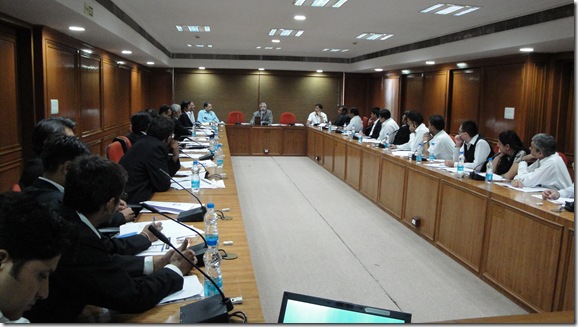
IBJ-India and Delhi High Court legal service committee (DHCLSC) organized a Panel discussion on 25.9.2009. The topic of the discussion was “Access to Justice: common Hurdles & Challenges”. Senior Police officers from Delhi Police, Standing Counsel (Prosecutions), a Senior Doctor from department of forensic All India institute of Medical Science and renowned Academician participated in the Panel discussion to identify common hurdles and challenges in Access to Justice.
The event was inaugurated by Hon’ble Mr.. Justice Madan B. Lokur, Chairman, DHCLSC. Hon’ble Chairman remarked that DHCLSC & IBJ INDIA has taken this initiative on “Access to Justice: common Hurdles & Challenges” as there are several facet to access to justice which needs to be looked into. The purpose of holding the discussion was to find out some solutions to overcome those hurdles. Hon’ble Chairman, DHCLSC remarked that there is lack of awareness amongst the general public about the existence of institutions which provide free legal aid. There is also lack of awareness about entitlement of legal aid, which keeps it’s real beneficiaries away from it. It was emphasized that there are two important hurdles one is lack of awareness and second is lack of quality. Free legal aid should not be poor legal aid.
Panelist Mr.. Sunil Gupta Principal Law Officer, Central Jail Tihar addressed about the common hurdles which are being faced in case of under trials and convicts lodged in Tihar Jail. Mr.. Gupta informed that Delhi prison is overcrowded, and there are presently 11600 prisoners lodged in the Tihar Jail against its sanctioned capacity of 6200 prisoners. Around two year back the number of prisoners was 14000. Around 83% of the prison population comes from the income start which is less than 4000 per month. To arrange legal aid for such segment of the prisoner is a huge task and legal service committee is doing its their best to meet the expectation. However, the efforts are inadequate because of huge population of such segment. In Delhi, around 35% of the prison population come from outside and it is difficult for them to arrange surety after they have been granted bail by the courts as a result of which they continue to languish in the prison. Those who are unable to furnish surety in such cases, should be released on personal bond if the trial courts find them so fit. Another Hurdle in Access to Justice identified by him was illiteracy. Around 37% of the prison population is illiterate. In Delhi 83% of prison population comprises of under trials.
Dr. Sudhir Gupta, Department of Forensic Medicine AIIMS suggested that it is very important factor in Police investigation how a police officer has conducted the investigation. If he is unaware about the scientific investigation then it may be fatal to the case. Dr. Sudhir Gupta pointed out common problems faced by the IO during investigation of on sexual offences particularly in collection of sample and their perseverance
 Sh. Karnail Singh, IPS remarked that everybody whose rights have been violated should have an access to justice. Generally a common man does not know the remedies available to him under the law. Quality and knowledge of IO are the most important factor in the quality of investigation. Sh. Karnail Singh pointed out that inordinate delay in the forensic report causes delay in the trial. Sh. Karnail Singh emphasized that Advocates have a significant role in justice Delivery system. It was suggested that punishment awarded should be reformative in nature. Sh. Karnail Singh expressed his concern on the issue that victim/complainant does not have much say on the entire system. Sh. Singh suggested that computerization of all the agencies involved in criminal justice system is essential part of effective criminal Justice System.
Sh. Karnail Singh, IPS remarked that everybody whose rights have been violated should have an access to justice. Generally a common man does not know the remedies available to him under the law. Quality and knowledge of IO are the most important factor in the quality of investigation. Sh. Karnail Singh pointed out that inordinate delay in the forensic report causes delay in the trial. Sh. Karnail Singh emphasized that Advocates have a significant role in justice Delivery system. It was suggested that punishment awarded should be reformative in nature. Sh. Karnail Singh expressed his concern on the issue that victim/complainant does not have much say on the entire system. Sh. Singh suggested that computerization of all the agencies involved in criminal justice system is essential part of effective criminal Justice System.
Ms. Mukta Gupta, Standing Counsel (Now sitting Judge of Delhi High Court) emphasized that lack of interaction with the clients is always fatal in the Court Case. An Advocate or Legal Aid Lawyers must do Good Homework before arguing the matter before a court. Inspection of Trial Court Record is always necessary before arguing the matter. She also informed about the guidelines issued by the High Court in sexual offences cases
Prof. S.C. Raina remarked identified that unnecessary adjournments is a curse to the right of the accused. Lack of awareness and Language Barrier is another factor in Access to Justice.
During the interactive discussion with Participants it was identified that low cooperation from the police is also a serious hurdle. Often people are denied of information about their case that is against them and denial in Access to counsel during interrogation is still a major challenge.
The event was concluded with the closing remarks by Secretary, Delhi High Court Legal Service Committee. The session came to an end by vote of thanks delivered by Sh. Ajay Verma, Advocate on behalf of IBJ (INDIA).


